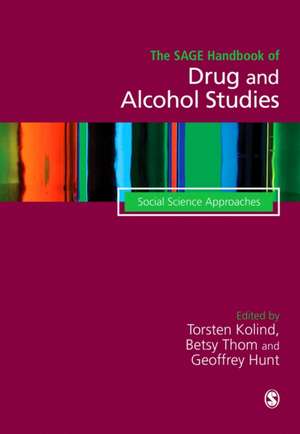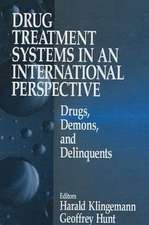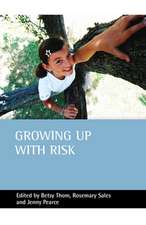The SAGE Handbook of Drug & Alcohol Studies: Social Science Approaches
Editat de Torsten Kolind, Betsy Thom, Geoffrey Hunten Limba Engleză Hardback – 2 noi 2016
· Part I Central Social Science Theories Drug and Alcohol Studies
· Part II Pillars in Social Science Drug and Alcohol Studies
· Part III Controversies and New Approaches in Social Science Drug and Alcohol Studies
This Handbook is an excellent reference text for the growing number of academics, students, scientists and practitioners in the drug and alcohol studies community.
Preț: 1150.44 lei
Preț vechi: 1494.08 lei
-23% Nou
Puncte Express: 1726
Preț estimativ în valută:
220.14€ • 229.39$ • 182.27£
220.14€ • 229.39$ • 182.27£
Carte tipărită la comandă
Livrare economică 31 martie-05 aprilie
Preluare comenzi: 021 569.72.76
Specificații
ISBN-13: 9781446298664
ISBN-10: 1446298663
Pagini: 742
Dimensiuni: 184 x 246 x 22 mm
Greutate: 1.45 kg
Ediția:1
Editura: SAGE Publications
Colecția Sage Publications Ltd
Locul publicării:London, United Kingdom
ISBN-10: 1446298663
Pagini: 742
Dimensiuni: 184 x 246 x 22 mm
Greutate: 1.45 kg
Ediția:1
Editura: SAGE Publications
Colecția Sage Publications Ltd
Locul publicării:London, United Kingdom
Recenzii
Social science approaches to drug and alcohol use offer the key to understanding complex social phemomena. The editor and authors of this volume are to be congratulated in providing an accessible and wide ranging introduction to the key theories; disciplinary approaches; topics and themes which characterise this area. For a thorough going introduction to drugs, alcohol and social science, this book will be the first port of call.
This handbook provides exceptional coverage, both broad and deep, of the shifting terrain of drug and alcohol studies. Top experts from across the social sciences and from a wide range of cultures insightfully distill the latest literature in crisp, clear prose. From history and theory to emerging approaches to public policy, their chapters show how the use and abuse of drugs intersect with class, race, gender,poverty, and the broader matrix of social problems and public policy in which drugs are embedded. An immensely useful resource.
This handbook encompasses the complex interdisciplinary field of social drug and alcohol studies from diverse approaches and angles: in terms of the approaches of different research disciplines and traditions, of different strategies of societal response, and of a range of controversies and new approaches. For those new to the field, it is a brilliant guide to different ways of framing and thinking about drug and alcohol issues, and where knowledge stands on each of them. For those already in the field, its up-to-date overviews and commentaries will be informative, intriguing and challenging. I found much in it that was a gripping and thought-provoking read.
This handbook provides exceptional coverage, both broad and deep, of the shifting terrain of drug and alcohol studies. Top experts from across the social sciences and from a wide range of cultures insightfully distill the latest literature in crisp, clear prose. From history and theory to emerging approaches to public policy, their chapters show how the use and abuse of drugs intersect with class, race, gender,poverty, and the broader matrix of social problems and public policy in which drugs are embedded. An immensely useful resource.
This handbook encompasses the complex interdisciplinary field of social drug and alcohol studies from diverse approaches and angles: in terms of the approaches of different research disciplines and traditions, of different strategies of societal response, and of a range of controversies and new approaches. For those new to the field, it is a brilliant guide to different ways of framing and thinking about drug and alcohol issues, and where knowledge stands on each of them. For those already in the field, its up-to-date overviews and commentaries will be informative, intriguing and challenging. I found much in it that was a gripping and thought-provoking read.
Cuprins
Section One: Central Social Science Theories in Drug and Alcohol Studies
Chapter 01: Central social science theories in drug and alcohol studies introduction - Editors
Chapter 02: Historical Perspectives - Mark Hailwood
Chapter 03: Sociological Perspectives - Franca Beccaria & Franco Prina
Chapter 04: Psychological Explanations of Addiction - Robert Hill and Jennifer Harris
Chapter 05: Anthropological study of drug use: Methodological and theoretical considerations - J. Bryan Page and Merrill Singer
Chapter 06: Criminological Perspectives - Karen Joe Laidler
Chapter 07: Cultural Studies Approaches to Drugs and Alcohol - Kane Race and Rebecca Brown
Chapter 08: Geographical perspectives on drug and alcohol studies - Mark Jayne, Gill Valentine and Sarah L. Holloway
Section Two: Pillars in Social Science Drug and Alcohol Studies
Chapter 09: Drug policy - Alison Ritter, Caitlin Hughes and Phillip Hull
Chapter 10: Alcohol policy in global context - James Nicholls
Chapter 11: Drug policy in practice - Esben Houborg and Bagga Bjerge
Chapter 12: National preventive approaches to tackle alcohol misuse - Elias Allara, Marica Ferri and Fabrizio Faggiano
Chapter 13: Community-focused approaches to the prevention of alcohol-related harms: from past experiences to future possibilities - Richard Midford and Anthony Shakeshaft
Chapter 14: Bridging Harm Reduction and Recovery - Heino Stöver
Chapter 15: The Treatment Response: Systemic Features, Paradigms and Socio-Cultural Frameworks - Harald Klingemann & Jessica Storbjörk
Chapter 16: Matching patients to treatments or matching interventions to needs? - Morten Hesse, Birgitte Thylstrup and Anette Søgaard Nielsen
Chapter 17: Workforce Development and professionalization - Anna Nelson
Chapter 18: Reflecting on Intoxication - Geoffrey Hunt and Vibeke Asmussen Frank
Chapter 19: Identity, Friendship and Sociality - Thomas Thurnell-Read
Chapter 20: Consumption and context - Mark Jayne, Gill Valentine, and Sarah L. Holloway
Section Three: Controversies and New Approaches in Social Science Drug and Alcohol Studies
Chapter 21: Addiction: Critical Reflections on a Debated Concept - Helen Keane
Chapter 22: Learning to live with ‘Big Fat Words’? An exploration of the dominant concepts applied to problem drug and alcohol use - Shane Butler and Paula Mayock
Chapter 23: The Increasing Visibility of Gender in the Alcohol and Drug Fields - Geoffrey Hunt, Tamar Antin, Jeanett Bjønness and Elizabeth Ettorre
Chapter 24: Ethnicity and drug policy in the USA - Bill Sanders
Chapter 25: Social class and deprivation - Angus Bancroft
Chapter 26: Maturing on a high: an analysis of trends, prevalence and patterns of recreational drug use in middle and older adulthood - Lisa Williams and Rebecca Askew
Chapter 27: Sex work, illicit drug use and the risk environment - Lisa Maher
Chapter 28: Homelessness and Substance Use - Betsy Thom and Carmen Aceijas
Chapter 29: The prison population and illegal drug use - Karen Duke and Torsten Kolind
Chapter 30: User perspectives - Bagga Bjerge, Caral Brown and Glenda Daniels
Chapter 31: The Relevance of Western Research to Developing Countries: Narrowing the North-South Divide in Drug Policy and Practice - Isidore Silas Obot
Chapter 32: The relevance of ‘Western’ alcohol research and policy to developing countries - Clare Herrick
Chapter 33: What’s So ‘New’ About New Psychoactive Substances? Definitions, prevalence, motivations, user groups and a proposed new taxonomy - Fiona Measham and Russell Newcombe
Chapter 34: The decriminalization of drugs - Henry H. Brownstein
Chapter 35: The limits of evidence-based practice in the pursuit of specific treatment efficacy - Anders Bergmark and Lena Hübner
Chapter 36: Public health approaches to substance use: a critique - Susanne MacGregor
Chapter 37: Illegal Street Economies and Drugs: Getting involved, skilled, and trying to quit - Philip Lalander
Chapter 38: Legal economies: The role of the alcohol industry - Jacek Moskalewicz and Lukasz Wieczorek
Chapter 39: Natures, Cultures and Bodies of Cannabis - Cameron Duff
Chapter 01: Central social science theories in drug and alcohol studies introduction - Editors
Chapter 02: Historical Perspectives - Mark Hailwood
Chapter 03: Sociological Perspectives - Franca Beccaria & Franco Prina
Chapter 04: Psychological Explanations of Addiction - Robert Hill and Jennifer Harris
Chapter 05: Anthropological study of drug use: Methodological and theoretical considerations - J. Bryan Page and Merrill Singer
Chapter 06: Criminological Perspectives - Karen Joe Laidler
Chapter 07: Cultural Studies Approaches to Drugs and Alcohol - Kane Race and Rebecca Brown
Chapter 08: Geographical perspectives on drug and alcohol studies - Mark Jayne, Gill Valentine and Sarah L. Holloway
Section Two: Pillars in Social Science Drug and Alcohol Studies
Chapter 09: Drug policy - Alison Ritter, Caitlin Hughes and Phillip Hull
Chapter 10: Alcohol policy in global context - James Nicholls
Chapter 11: Drug policy in practice - Esben Houborg and Bagga Bjerge
Chapter 12: National preventive approaches to tackle alcohol misuse - Elias Allara, Marica Ferri and Fabrizio Faggiano
Chapter 13: Community-focused approaches to the prevention of alcohol-related harms: from past experiences to future possibilities - Richard Midford and Anthony Shakeshaft
Chapter 14: Bridging Harm Reduction and Recovery - Heino Stöver
Chapter 15: The Treatment Response: Systemic Features, Paradigms and Socio-Cultural Frameworks - Harald Klingemann & Jessica Storbjörk
Chapter 16: Matching patients to treatments or matching interventions to needs? - Morten Hesse, Birgitte Thylstrup and Anette Søgaard Nielsen
Chapter 17: Workforce Development and professionalization - Anna Nelson
Chapter 18: Reflecting on Intoxication - Geoffrey Hunt and Vibeke Asmussen Frank
Chapter 19: Identity, Friendship and Sociality - Thomas Thurnell-Read
Chapter 20: Consumption and context - Mark Jayne, Gill Valentine, and Sarah L. Holloway
Section Three: Controversies and New Approaches in Social Science Drug and Alcohol Studies
Chapter 21: Addiction: Critical Reflections on a Debated Concept - Helen Keane
Chapter 22: Learning to live with ‘Big Fat Words’? An exploration of the dominant concepts applied to problem drug and alcohol use - Shane Butler and Paula Mayock
Chapter 23: The Increasing Visibility of Gender in the Alcohol and Drug Fields - Geoffrey Hunt, Tamar Antin, Jeanett Bjønness and Elizabeth Ettorre
Chapter 24: Ethnicity and drug policy in the USA - Bill Sanders
Chapter 25: Social class and deprivation - Angus Bancroft
Chapter 26: Maturing on a high: an analysis of trends, prevalence and patterns of recreational drug use in middle and older adulthood - Lisa Williams and Rebecca Askew
Chapter 27: Sex work, illicit drug use and the risk environment - Lisa Maher
Chapter 28: Homelessness and Substance Use - Betsy Thom and Carmen Aceijas
Chapter 29: The prison population and illegal drug use - Karen Duke and Torsten Kolind
Chapter 30: User perspectives - Bagga Bjerge, Caral Brown and Glenda Daniels
Chapter 31: The Relevance of Western Research to Developing Countries: Narrowing the North-South Divide in Drug Policy and Practice - Isidore Silas Obot
Chapter 32: The relevance of ‘Western’ alcohol research and policy to developing countries - Clare Herrick
Chapter 33: What’s So ‘New’ About New Psychoactive Substances? Definitions, prevalence, motivations, user groups and a proposed new taxonomy - Fiona Measham and Russell Newcombe
Chapter 34: The decriminalization of drugs - Henry H. Brownstein
Chapter 35: The limits of evidence-based practice in the pursuit of specific treatment efficacy - Anders Bergmark and Lena Hübner
Chapter 36: Public health approaches to substance use: a critique - Susanne MacGregor
Chapter 37: Illegal Street Economies and Drugs: Getting involved, skilled, and trying to quit - Philip Lalander
Chapter 38: Legal economies: The role of the alcohol industry - Jacek Moskalewicz and Lukasz Wieczorek
Chapter 39: Natures, Cultures and Bodies of Cannabis - Cameron Duff
Descriere
With contributions from leading international academics across the social sciences, this accessible handbook takes a critical look at the key theories, disciplinary approaches, contemporary issues and debates in the field.



